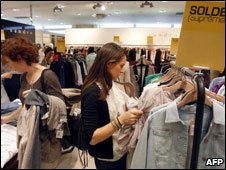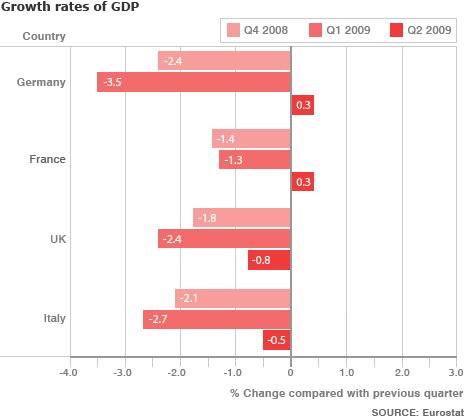France and Germany exit recession
 The French and German economies both grew by 0.3% between April and June, bringing to an end year-long recessions in Europe’s largest economies.
The French and German economies both grew by 0.3% between April and June, bringing to an end year-long recessions in Europe’s largest economies.Stronger exports and consumer spending, as well as government stimulus packages, contributed to the growth.
The data came as a surprise, with few analysts expecting Germany and France to start to recover so soon.
But economic activity in the eurozone fell by 0.1%, showing the region as a whole is still in recession.
It was the fifth consecutive quarter of economic contraction in the eurozone, but was a marked improvement on the 2.5% drop recorded in the first three months of the year.
UK reaction
France and Germany may have been less hard hit than the UK by the global economic slowdown because their financial sectors, which were at the heart of the crisis, account for a smaller proportion of their economies.
Export recovery
Germany was thrown into recession earlier in the year because its exports collapsed.
Peter Mandelson: “The outlook for our own economy is also strengthening”
The latest figures showed German exports had grown at their fastest pace for nearly three years at 7%, with particularly strong growth in demand from rapidly-growing economies such as China.
The country’s Federal Statistics Office said that household and government expenditure had also boosted growth.
It added that imports had declined “far more sharply than exports, which had a positive effect on GDP growth”.
“These [GDP] figures should encourage us,” said Germany’s Economy Minister Karl-Theodor zu Guttenberg. “They show that the strongest decline in economic performance likely lies behind us.”
Reaction among analysts to the signs of Germany’s recovery, however, was mixed.
Markets reacted positively to the news, with the main German and French markets up more than 1% at midday before later dropping back slightly.
In London, the FTSE 100 index also rose, with traders anticipating a positive effect on the UK economy, which by contrast shrank by 0.8% in the second quarter.
Asked about why the UK seemed to be lagging behind, Business Secretary Lord Mandelson said: “Different economies will show different patterns of behaviour.”
“But the key point is all these economies rely on each other; 55 to 56% of our trade is with the rest of Europe. So when [they are] recovering that is good news for our manufacturers and our exports here.”
“The recession has ended, and it has ended sooner than we all thought. We expect to see growth of 1% in the third quarter, which is very strong for Germany, and I wouldn’t rule out the chance of even better growth,” said Andreas Rees at Unicredit.
But there are concerns that the banking system across Europe is still fragile and that the growth is reliant on government stimulus spending that will eventually have to come to an end.
BBC Europe business reporter Mark Sanders said that although the surprise news was highly welcome for those that have been suffering, there were questions about how strong and credible the economic recovery is.
“To draw a medical analogy, we’ve got the patient waking from a coma and talking to medical staff,” he said. “They’re not necessarily going to be running any marathons soon.”

Consumer spending
In France, economy minister Christine Lagarde said: “The data is very surprising. After four negative quarters France is coming out of the red.”
Ms Lagarde said that consumer spending and strong exports had helped to pull France out of recession.
“What we see is that consumption is holding up,” she said.
Official figures showed that household consumption rose by 0.4% in the second quarter.
She said government incentive schemes for trading in old cars, together with falling prices, were helping consumers.
Foreign trade contributed 0.9% to the GDP figure - a “very strong impact”, said Ms Lagarde.
“[The figures are] a positive surprise, as many people were expecting slightly negative numbers,” said Marie Diron at Oxford Economics.
But she warned that growth was “still very fragile”.
“Investment is down, we still have surprisingly low stock levels, and growth is boosted by the fact that imports fell sharply,” she added.
Source: BBC News
You can return to the main Market News page, or press the Back button on your browser.

